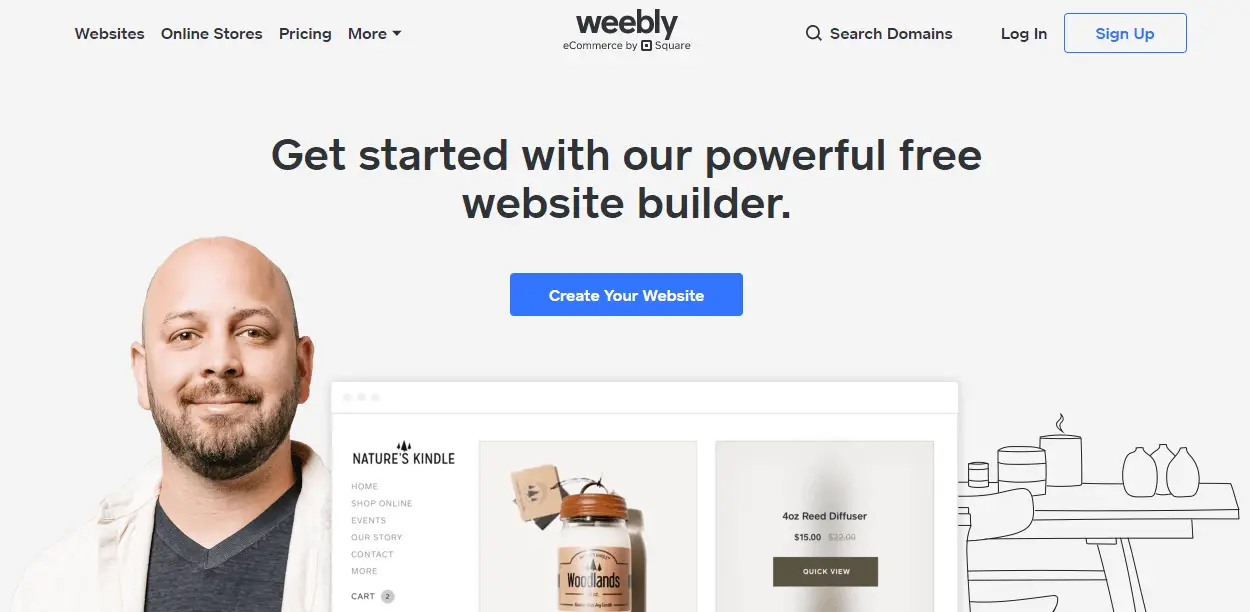One of the biggest decisions you have to make when building a website is choosing the right website builder as it will greatly affect the appearance as well as the performance of your site.
When it comes to photographers, website builders allow you to launch a photography website that displays quality images that are easy to manage. This is why you need an appropriate website builder that will accommodate your needs and won’t break the bank. Assuming you don’t have any technical skills, you’ll most likely be aiming for an easy-to-use builder, but that isn’t always the best way to go.
To help you determine the best website builder for you, I’ll talk about how the most popular builders perform in various areas of interest such as design, SEO, analytics, and of course, ease of use.
Now, onto exploring today’s topic!
How to Pick The Best Website Builder For A Photography Website

It is not easy to pick the right one but with enough research and detailed website builder comparison, I’m sure you’ll do just fine. There are various features that you need to consider when picking a website builder, and even though some website builders may appear to have the same features, they don’t always operate the same way, which may not please all users.
For example, some users (beginners) prefer a simpler easy-to-use interface, while others (advanced users) want something that is more expandable and scales easier.
Ease of Use
- Simplicity – you want a website builder that is easy to use and has a simple interface with drag-and-drop functionality, which will save you a lot of time.
- Learning Curve – assuming you don’t have much tech knowledge, you probably don’t want to spend a lot of time learning how to set up a website. Some website builders don’t require lots of learning and are oriented towards beginners.
- Setup Time – you probably want to get your photography website online as soon as possible, so the less time it takes, the better.
- Management & Maintenance – you shouldn’t need any third-party help to manage your site and it should be easy to take care of any updates.
Quality Customer Support

- Support Team – check where you can reach them (live chat & email) and how easy it is to get in touch with their support team.
Features
- eCommerce – if you want to sell online, you’ll need a website builder that supports it.
- Advertising – embed Google Ads and start earning money by displaying ads on your website.
- SEO – look for website builders with tools that help you to rank better in search engine results.
- Marketing – marketing tools that help promote your work.
- Analytics – analytics tools monitor your website’s traffic and keep you in the loop.
- Unique Features – if you require some special features then ask around who offers those specific features and/or services.
There are some useful features that will make your life much easier but they will come at a cost. However, you might not need all of the numerous features, so make sure to do your research and you could save some money.
Think ahead, you don’t want to get the cheapest option if you’re thinking of upgrading in the near future.
Scalability
- Custom Code – most website builders use standardized code, which enables various features, but it is good to have custom features at hand to allow the use of your own (custom) code. This can be very useful but you can live without it.
- Site Migration – if you decide to host your website yourself, most likely, you’ll have to redevelop your site from scratch as some website builders don’t allow this.
- Integrations – if you want to monetize your website and install ads or embed third-party code, you’ll need a website builder that is compatible with third-party apps.
Design

- Themes – typically, you start with a predesigned website that you can customize to your liking.
- Mobile-responsiveness – most website builders automatically optimize your website for mobile devices but some do it better than others.
- Template Customization – you can use various built-in tools to customize your template.
You want to make sure that your website performs well (load time) and is responsive on all devices.
To lower your bounce rate, try to make it easy for visitors to navigate through your website. Satisfied visitors turn into customers more easily.
When it comes to design, it depends on what you’re aiming for. Do you want a more professional-looking site or a friendlier one? The good news is that there are already loads of pre-designed templates that will work just fine either way.
Plans
- Trial – Before spending your hard-earned money, I highly encourage you to try out a trial version of a website builder as it allows you to test its tools and features. Find out what features you need and see if they are easy to use.
- Premium – if you want all the bells and whistles, you’ll have to pay for it. Still, there are numerous plans, so I’m sure you’ll find one that fits your needs and budget.
- Hosting & Domains – usually, website builders will host your website and, in most cases, it is included in the price. However, some will also offer you a domain, which is typically purchased separately (elsewhere).
You have to spend money to make money, so do your business a favor and invest in it wisely.
If you want to launch a simple site, then you don’t need to spend a lot of money as you won’t be using those advanced features anyway.
Ownership Costs

- Price – everyone’s needs and budget are different, so try to find the builder that works best for you. Unfortunately, some website builders can be quite expensive so do your research.
Keep in mind that more expensive website builders tend to offer more solutions and support, which may be worth it in the long run.
The Best Website Builders for a Photography Website
- WordPress – most usable and scalable solution
- Wix – easiest to use and set up
- Squarespace – also easy to use and set up
- Weebly – cheapest solution for getting online
- Shopify – best for photography stores
WordPress

A renowned website builder that has been around for more than a decade and is one of the best content management systems available. However, WordPress is divided into two platforms that require different skills.
WordPress.org – the free WordPress version that allows you to host your own website but requires you to be more tech-savvy (flexible).
WordPress.com – the paid version where WordPress takes care of things for you but doesn’t allow you to customize everything (restrictive).
Pros
- Full Control – it is fully customizable and you have more freedom when it comes to design and functions.
- Perfect for Bloggers –portrays your content in the best light. It comes with superior tools that make managing content much easier.
- WordPress Plugins – need something done but don’t know how to do it? Grab a plugin and have the work be done for you in just a few clicks.
Cons
- Coding – to develop a WordPress site, you’ll need to use code, especially if you want to update and maintain your site.
- Learning Curve –managing and updating your website on your own will be difficult. Redesigning your site or installing a plugin to enable advanced features will require your utmost effort.
- Security – if you self-host your WordPress site, you’ll be prone to cyberattacks. Thankfully, some WordPress plugins can help you protect your site.
I highly recommend WordPress to advanced bloggers and big content-based businesses who want to squeeze the most out of their website. The platform excels at optimizing content management, and SEO, so you shouldn’t have any problems. However, beginners should stay away as it is hard to master.
Wix

Wix is one of the largest website hosts mostly because it allows you to start any site without any coding. Some say it is the best all-around choice, but you can easily test that out yourself. It is designed towards an average Joe and comes with lots of advanced features.
Pros
- Useful (Built-in) Apps – you can enable loads of features through Wix’s app market in just a few clicks.
- Covers Most Needs – whether you want to set up an eCommerce store, blog, or a basic information site, Wix has you covered. Works well on mobile devices and has good SEO strategies.
- Predesigned Templates – numerous pre-designed templates that automatically reformat your website for the best user experience on mobile devices.
- Integrations – integrates with Unsplash (stock photo website), which is great for photographers.
Cons
- Average User Interface – don’t get me wrong, it isn’t bad at all but it does require some getting used to. Once you start customizing your website, you’ll probably have to use Google’s advice a few times.
- Lacks Migration – the worst part of Wix is that you’re locked in and can’t transfer your website elsewhere. Everything is tied to Wix exclusively.
- Doesn’t Deliver Enough – even with loads of useful features, it doesn’t allow you to customize everything and it isn’t the best for monetizing your content.
Although Wix isn’t the best, it still is a viable choice and even I use it. I recommend Wix mainly for smaller startups and personal blogs. As a beginner, you’ll have to look up a few tricks but that won’t be the end of the world.
I would avoid Wix if eCommerce is your main concern as there are better solutions such as Shopify.
Squarespace

A popular website builder for photography websites with fresh-looking designs that will catch anyone’s eye. So if you’re going for an exclusive look, you should definitely consider it.
Pros
- Looks & Works Great – stunning and quite creative templates that automatically reformat and work on all devices.
- Built-in Tools – similar to Wix, it comes with lots of nifty tools and offers stock photos.
Cons
- Pricey – not so budget-friendly.
- Learning Curve – Squarespace’s builder requires more getting used to than Wix’s.
Suited for professionals who want a unique design and require a good photo editor. It also has strong SEO features and allows you to add a blog section, so you have no worries there.
Weebly

A simple drag-and-drop website builder focused on ease of use. If you want simplicity and aren’t keen on learning, Weebly could be the way to go. It is straightforward, which I’m sure that beginners appreciate.
Pros
- Easy to Use – simple interface with drag-and-drop functions, as well as email and popup explanations to help you with most things.
- Migration – you can transfer your website from Weebly and host it on your own.
- Affordable – one of the most affordable website builders.
Cons
- Lacks Features – unlike other builders, it has fewer features and a minimalistic design.
- Restrictive Customization – you can’t customize certain web elements.
- Scalability – your upgrade path is limited.
Weebly is great for beginners who just want a barebones website that requires as little maintenance as possible.
Shopify

As the name suggests, it is designed for selling any products online. A dedicated eCommerce platform and website builder that excels at helping you set up, manage, and promote your store online, a well as sell pretty much anything fairly easily.
Pros
- eCommerce – the best commercial platform for maximizing your conversions.
- Security – handles transactions securely and has strong cybersecurity measures, unlike other solutions.
- Integrations – integrates with third-party platforms and allows you to promote your sales on multiple platforms.
Cons
- Only Excels at eCommerce – lacks some features that other website builders provide. Unlike WordPress’, their content management system is highly restrictive.
- Fees – includes a transaction fee per each sale as well as payment provider fees.
If you’re simply looking to sell photos online, this is the platform for you as it allows you to establish your brand quite quickly by launching a customer-friendly eCommerce store.
Conclusion
To sum things up, only you can decide what’s the best website builder for you. But hopefully, I’ve pointed you in the right direction. I highly suggest you take advantage of the trial versions to test things out, and I’m sure you’ll find the builder for you in no time.

